The UN Summit on Safe and Ethical AI brings together global leaders, innovators, and civil society to create standards that guarantee AI benefits everyone responsibly. It focuses on developing ethical frameworks, fostering international cooperation, and promoting transparency, accountability, and inclusivity. By addressing challenges like bias, misuse, and rapid technological change, the summit aims to guide AI toward positive societal impact. If you want to learn how these efforts will shape AI’s future, there’s more to explore.
Key Takeaways
- The UN Summit brings together global stakeholders to promote responsible, ethical AI aligned with Sustainable Development Goals.
- Focuses on developing international standards for transparency, accountability, and human rights protections in AI.
- Emphasizes multi-stakeholder collaboration to address biases, misuse, and societal inequalities in AI development.
- Highlights initiatives like AI watermarking and deepfake detection to ensure AI security and trust.
- Aims to foster policy dialogue, ethical frameworks, and regulatory agility for safe AI innovation worldwide.
The Mission and Scope of the Summit

Have you ever wondered how the UN harnesses AI to tackle global challenges? The AI for Good Global Summit 2025 aims to do just that by bringing together innovators, policymakers, and civil society to promote responsible AI use aligned with the UN’s Sustainable Development Goals. Its mission is to foster collaboration, accelerate AI-driven solutions, and develop ethical frameworks that guarantee AI benefits everyone. The summit’s scope covers policy dialogues, ethical standards, and practical applications across sectors like health, climate, and education. It emphasizes balancing technological advancements with human rights, safety, and trust. By connecting diverse stakeholders in a hybrid format, the summit creates a global platform to shape AI’s future responsibly, ensuring it addresses societal needs and mitigates risks. Understanding the importance of ethical standards in AI development is crucial for ensuring safe and fair deployment worldwide. Additionally, ongoing efforts to monitor AI behavior and implement robust safety measures are vital for maintaining trust and security in AI systems globally. Recognizing that dreams can reflect subconscious concerns about safety and control highlights the need for rigorous oversight and ethical considerations in AI development. Developing comprehensive regulatory frameworks is also essential to guide responsible innovation and prevent misuse of AI technologies, especially considering the rapid pace of advancements in AI capabilities.
Key Focus Areas and Discussions
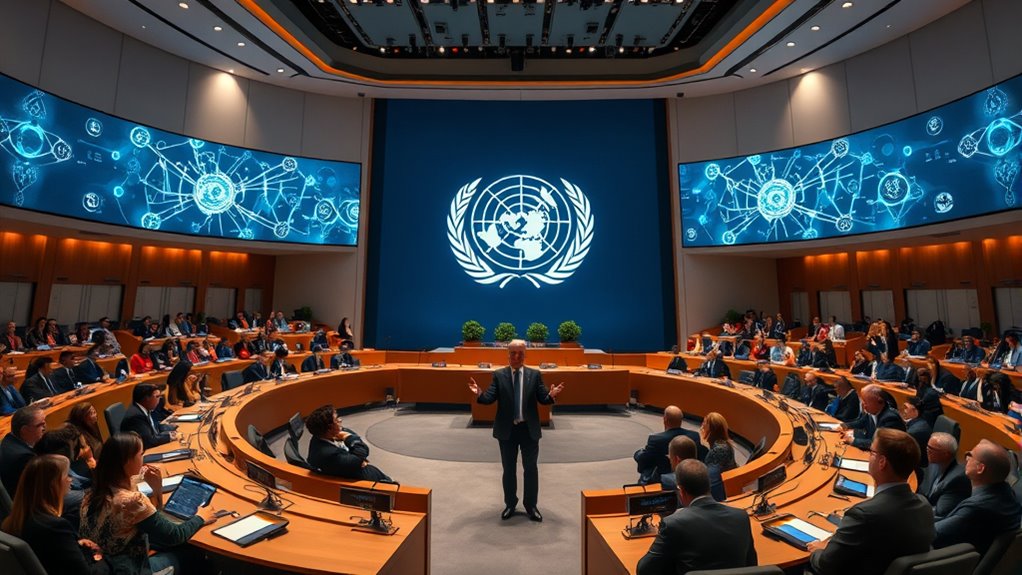
As AI governance challenges grow, you need to contemplate how to develop ethical frameworks that keep pace with technological advancements. The summit emphasizes creating inclusive, multi-stakeholder policies to address risks like bias, misuse, and societal inequality. Recognizing the importance of best practices in AI, the summit aims to foster international cooperation and standards to ensure responsible development and deployment of artificial intelligence technologies. Incorporating color accuracy in projectors into these discussions can help promote equitable access to high-quality visual experiences globally. Additionally, emphasizing positive energy and intentions can be essential in guiding the development of AI systems that align with human values and ethical considerations, ensuring that technological progress benefits all segments of society. Promoting ethical standards in AI development is crucial to building public trust and safeguarding human rights, which remains a critical priority for shaping AI’s future impact. Furthermore, establishing clear guidelines for Gold IRA investments can serve as a model for implementing responsible and transparent policies in emerging technological fields.
AI Governance Challenges
AI governance faces urgent challenges as rapid technological advances outpace current regulatory frameworks, making it difficult to guarantee safety, trustworthiness, and human rights protection. You need adaptable policies that keep up with evolving AI systems, especially with autonomous and generative AI gaining prominence. Addressing societal inequalities and environmental impacts requires inclusive, multi-stakeholder approaches that balance innovation with responsibility. You must consider international standards—such as those developed by ITU, ISO, and IEC—to foster transparency, detect deepfakes, and implement AI watermarking. Ensuring accountability involves establishing clear oversight mechanisms and preventing biases embedded in algorithms. As AI becomes more complex, you’ll need proactive governance models that can anticipate risks, promote ethical practices, and safeguard fundamental human rights while supporting sustainable technological progress. Incorporating lessons from cybersecurity incidents like the Cybersecurity breach emphasizes the importance of comprehensive security measures in AI development and deployment. Additionally, developing robust security protocols is essential to mitigate emerging threats and maintain public trust. Furthermore, fostering international cooperation is critical to harmonize standards and ensure responsible AI use across borders. Recognizing the importance of adaptive policy frameworks can help organizations stay aligned with the rapid evolution of AI capabilities and associated risks. Emphasizing the need for regulatory agility ensures policies remain effective amid constant technological change.
Ethical Framework Development
Developing ethical frameworks for AI requires a proactive approach that balances innovation with societal values. You need to prioritize transparency, accountability, and human rights, ensuring AI systems serve everyone fairly. During the summit, discussions emphasized creating global standards that address biases, privacy, and safety, preventing harms like discrimination or misinformation. You should focus on embedding ethical principles into AI design from the start, fostering trust among users and stakeholders. Multi-stakeholder collaboration is vital—governments, industry, and civil society must work together to develop adaptable, culturally sensitive guidelines. By doing so, you help shape AI that aligns with long-term societal goals, safeguards fundamental rights, and promotes responsible innovation, ultimately ensuring AI benefits all while minimizing risks. Additionally, understanding the importance of creating safe and ethical AI can guide the development of trustworthy systems that respect cultural differences and societal norms. Recognizing the significance of AI safety standards from existing discussions can further enhance these frameworks. Incorporating lessons from recent AI discoveries, such as AI’s ability to manipulate quantum particles or rewrite DNA, underscores the need for rigorous safety and ethical oversight to prevent potential misuse or unintended consequences. Moreover, integrating mindfulness principles in AI development—such as transparency and human-centered design—can foster greater trust and responsible innovation.
Addressing Ethical and Governance Challenges

Addressing ethical and governance challenges in AI requires a proactive and collaborative approach that keeps pace with rapid technological advancements. It’s vital to establish global standards for transparency, accountability, and human rights protections, preventing biases and societal inequalities. You should support initiatives like AI watermarking and deepfake detection to build trust and security. A comprehensive understanding of electricity production from bike generators can inform sustainable energy practices in AI development. Balancing innovation with ethical responsibility is essential to avoid environmental strain and misuse. You must foster international cooperation, ensuring policies are aligned across borders. By doing so, you help create a future where AI benefits society while safeguarding fundamental rights and addressing risks associated with autonomous and agentic systems. Additionally, understanding the role of Creative Practice in developing innovative solutions can help stakeholders approach AI challenges with more resilience and adaptability. Incorporating ethical frameworks into AI development processes can further ensure responsible innovation. Developing a Cultural Intelligence perspective can also enhance cross-cultural understanding and promote more inclusive AI governance. Emphasizing global standards can facilitate consistent and fair regulation across different regions and cultures.
Showcasing Innovative AI Applications
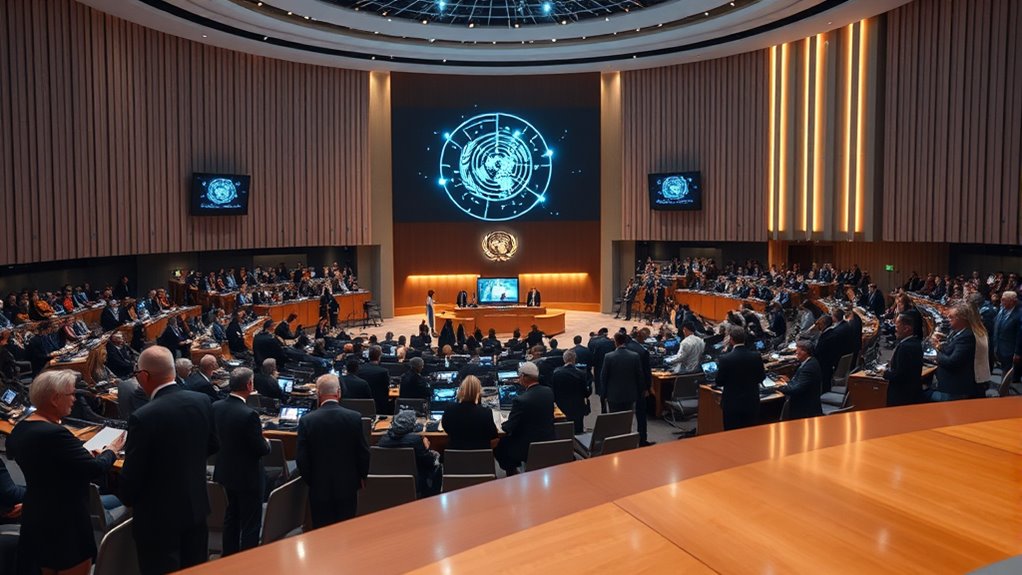
Innovative AI applications showcased at the summit demonstrate how technology can be harnessed for social good across diverse sectors. You see AI-powered robots assisting in disaster zones, swiftly maneuvering debris to locate survivors. Imagine data-driven precision farming tools that optimize water and fertilizer use, boosting food security in vulnerable regions. Healthcare innovations are also on display, with AI systems diagnosing diseases faster and more accurately, even in remote areas.
AI innovations for social good: disaster response, sustainable farming, and improved healthcare worldwide.
- Robots supporting emergency response, saving lives in real time.
- AI-driven sensors enhancing sustainable agriculture and resource management.
- Diagnostic tools improving healthcare access and outcomes globally.
These examples highlight AI’s potential to address critical global challenges, making a tangible difference in communities worldwide.
Collaborative Initiatives and Future Goals
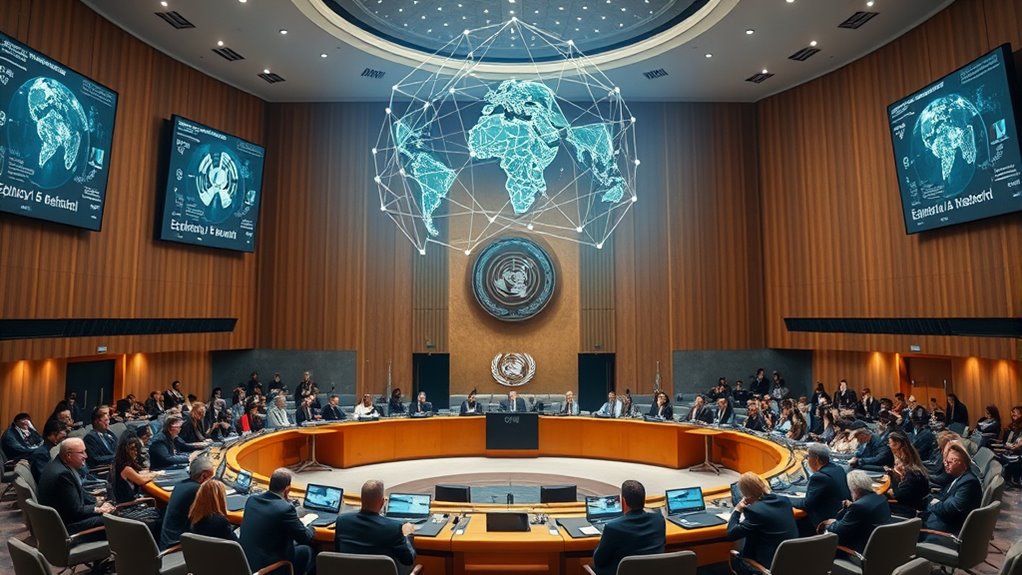
Building on the showcased AI applications, the summit emphasizes the importance of collaborative efforts to scale these solutions globally. You’re encouraged to engage across sectors—governments, private companies, academia, and civil society—to develop responsible AI policies and share best practices. The summit launched initiatives like the AI for Good Impact Initiative, designed to boost regional engagement through competitions, accelerators, and policy guidance. You’ll see a push to harmonize global AI standards with organizations like ISO and IEC, fostering consistency and trust. Future goals focus on strengthening AI governance frameworks to address emerging technologies, including autonomous systems. You’re invited to participate in ongoing digital platforms and local chapters, ensuring continuous collaboration, knowledge-sharing, and innovation beyond the summit’s scope. Emphasizing global standards, the summit highlights the need for a unified approach to AI safety and ethics worldwide.
Promoting Inclusivity and Responsible AI Development
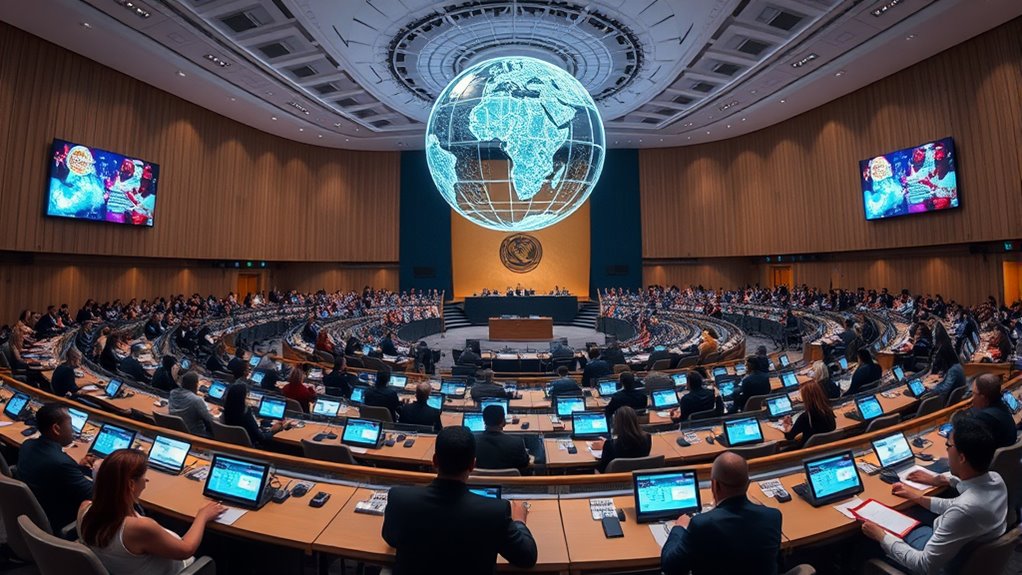
Promoting inclusivity and responsible AI development is essential to guarantee that the benefits of AI reach everyone and that risks are minimized. You can help by supporting initiatives that ensure diverse voices are heard in AI design and policymaking. Imagine:
Supporting diverse voices in AI design promotes fairness and minimizes risks for all.
- Global Training Programs: Equipping marginalized communities with skills to participate in AI innovation.
- Inclusive Data Sets: Developing datasets that reflect diverse populations to reduce bias and discrimination.
- Multistakeholder Governance: Engaging governments, civil society, and private sectors to create equitable AI policies.
The Road Ahead for Global AI Governance
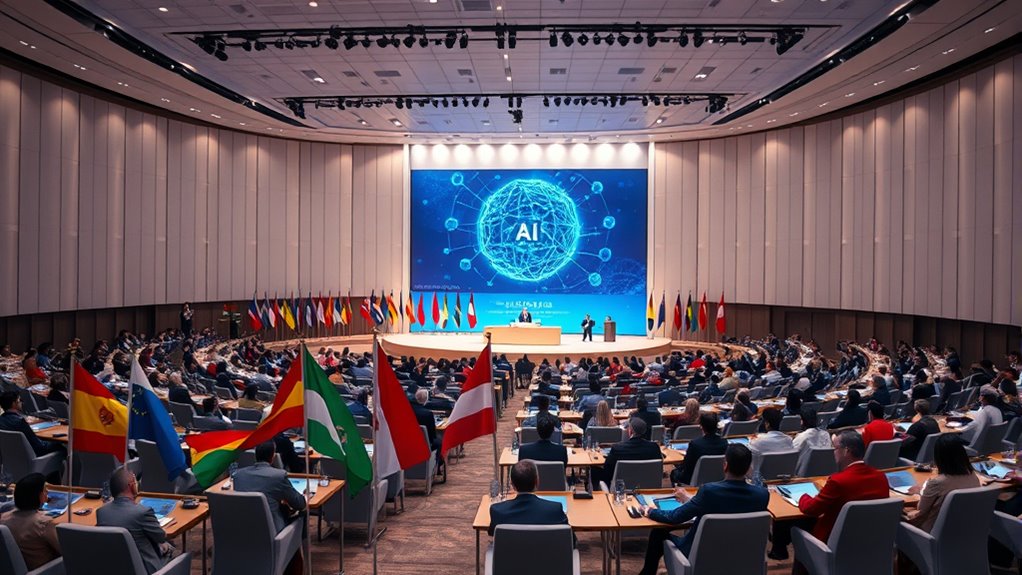
As AI continues to evolve rapidly, developing universal standards becomes essential to guarantee safe and ethical deployment worldwide. You need to prioritize inclusive governance that brings together governments, industry, and civil society to address diverse needs and risks. Together, these efforts will shape a cohesive framework that supports innovation while protecting human rights and societal values.
Developing Universal Standards
Developing universal standards for AI governance is essential to guarantee consistent safety, transparency, and ethical use across borders. You need clear frameworks that unify diverse approaches, ensuring AI benefits everyone equally. To achieve this, global efforts focus on:
- Establishing common technical protocols for AI watermarking and deepfake detection that create a consistent digital landscape.
- Creating shared ethical principles that guide AI development, embedding human rights and fairness into every system.
- Harmonizing regulations through international bodies like ITU, ISO, and IEC to prevent fragmentation and promote cooperation.
Ensuring Inclusive Governance
To guarantee inclusive governance of AI, global efforts must prioritize broad participation from diverse stakeholders, including governments, civil society, industry, and marginalized communities. You need to create platforms where all voices are heard, ensuring policies reflect varied perspectives and needs. This approach helps prevent biases and societal inequalities from deepening through AI deployment. You should foster transparency and trust by involving marginalized groups in decision-making processes and developing accessible, culturally sensitive frameworks. International collaboration is essential to harmonize standards and share best practices, ensuring AI benefits everyone, not just the privileged. By actively engaging these groups, you help build an equitable AI ecosystem that promotes responsible innovation and safeguards human rights worldwide.
Frequently Asked Questions
How Does the Summit Ensure AI Benefits All Countries Equally?
You can see that the summit promotes equal AI benefits by fostering global collaboration through multi-stakeholder partnerships, including governments, civil society, and private sectors. It emphasizes inclusive innovation, empowering youth and minority groups, and creating local platforms for ongoing engagement. The summit also advocates for developing universal AI standards and policies, ensuring equitable access, and addressing societal gaps, so all countries can harness AI’s potential responsibly and fairly.
What Are the Specific Steps for Implementing AI Standards Globally?
You should actively participate in international collaborations led by organizations like ITU, ISO, and IEC to develop unified AI standards. Advocate for inclusive policymaking that considers diverse regional needs, and support the creation of transparent frameworks for AI safety, ethics, and governance. Push for harmonized regulations, share best practices, and engage stakeholders across sectors to guarantee these standards are adopted and enforced globally. This collective effort helps create a consistent, responsible AI ecosystem worldwide.
How Are Risks Like AI Bias and Misinformation Actively Managed?
You actively manage AI bias and misinformation by implementing inclusive, transparent standards that promote fairness and accountability. You support multi-stakeholder collaborations to develop global frameworks, like AI watermarking and deepfake detection, that identify and mitigate misinformation. You also encourage continuous monitoring, validation, and updating of AI systems to guarantee they align with ethical principles, safeguard human rights, and reduce societal inequalities caused by biased algorithms or false information.
What Role Do Youth and Marginalized Groups Play in AI Policy Shaping?
You play a crucial role in shaping AI policy by amplifying diverse voices often unheard. While policymakers set rules, marginalized groups bring lived experiences that highlight overlooked issues like bias and access. Your participation guarantees AI development remains inclusive, equitable, and ethical. By advocating for representation and fairness, you help create policies that serve everyone, fostering trust and innovation that reflect the needs of society’s most vulnerable.
How Will AI Innovations Be Monitored for Ethical Compliance Over Time?
You’ll see AI innovations monitored for ethical compliance through ongoing frameworks, standards, and multi-stakeholder collaborations. Regular audits, transparency measures, and adaptive policies guarantee AI adheres to human rights and safety standards. Governments, international organizations, and private sectors work together to develop tools for detecting biases, deepfakes, and misuse. Continuous oversight, feedback loops, and updated regulations help maintain ethical integrity, fostering responsible innovation that aligns with societal values over time.
Conclusion
Imagine AI as a powerful ship steering through vast seas—you’re the captain guiding toward safe harbors. The summit shows that with shared responsibility, ethical guidelines, and innovation, we can avoid storms and chart a course for a brighter future. Just like sailors rely on charts, we need global cooperation to guarantee AI benefits all, responsibly and inclusively. Together, you can help guide this journey toward safe and ethical AI for generations to come.










